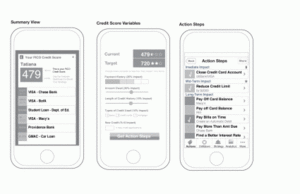Future Now
The IFTF Blog
Learning in the Algorithmic Age
Not long ago, I wanted to consider how we could provide better tools for foresight, insight and action for individual people to use in their everyday life. The FICO score seems like a great case study.
Credit scores, like FICO, are used to gauge a person's creditworthiness. They measure the likelihood that a person will pay off their debts. In order to do this, the reporting agency uses an algorithm to account for a range of variables related to a person's history. This results in a score that's used as an index to determine how they rate. The score is then used by all types of lenders and credit providing agencies to access their risk of lending.
As you are probably aware, credit score can impact the rates that people receive when borrowing money, which in turn affects their long-term financial viability. A lower score means higher rates, and that can lead to more debt. The problem is, there isn't very much a person can do to really understand the impact of their behavior on credit scores. Most people are given "black-boxed" actions that they are supposed to follow in order to achieve a solid credit history. Unfortunately, they don't have any real control over the outcomes since they can't SEE the relationships between the variables in the credit score model.
If you could see these relationships, they might start to look like KILL MATH.
My guess is that credit agencies do not want to share the precise algorithm they use for two reasons.
1) They want to maintain it as a proprietary intellectual property.
2) They want to keep people from gaming the system.
To the second point, my personal feeling is that if the model was truly reliable, people wouldn't be able to game the system. However, I think some people are able to make the system work better for them, and that creates a bit of uneven access to financial tools -- tools that would otherwise provide greater financial resilience. Knowing, for example, that co-signing credit for your kid will immediately attach your credit history to theirs and help improve their score at the outset is something that's not widely practiced, but it can have an impact.
It's also interesting that credit scores take a hindsight perspective and not a foresight perspective. This means that factors like current job do not figure into the score's model.
To think and design my way through that process, I developed a prototype of a tool that would begin to help individuals understand their actions, how their behaviors relate to financial algorithms, and the factors that make a difference to those models.

For the FICO score, five factors matter: payment history (35%), credit utilization ratio (30%), credit history length (15%), recent searches for credit (10%), and other (10%). Not much information is provided about how to improve these scores, other than the directionality and proportion of impact. For example, as your credit history length increases, your score is expected to improve slowly with up to 15% impact on your total score. However, are there thresholds buried in the model? Is reaching a 5 year mark is significant? And what about the rate of change?
How do we design interactive tools and transparency into our data to help people explore the variables of models (like FICO)? What does it look like? And what are the barriers to making big data accessible and transparent so that people can manage those impacts successfully?



